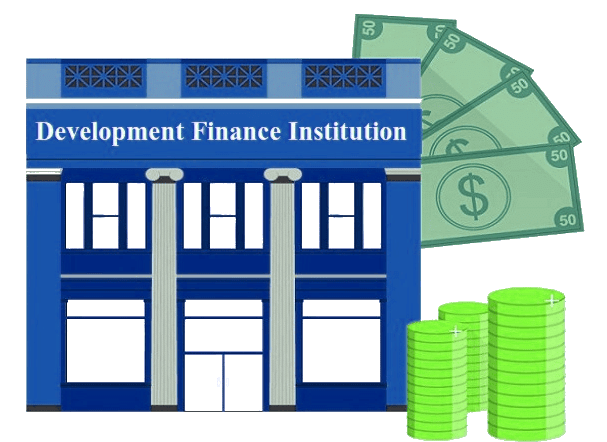UGC NET Exam > UGC NET Notes > Crash Course for UGC NET Commerce > Development Finance Institutions (DFIs)
Development Finance Institutions (DFIs) | Crash Course for UGC NET Commerce PDF Download
| Table of contents |

|
| Development Finance Institutions |

|
| Types of Financing Offered |

|
| Objectives of Development Finance Institutions |

|
| Notable DFIs (Sector-Specific) |

|
Development Finance Institutions

Development finance institutions (DFIs) or development finance companies are entities often owned by the government or charitable organizations that provide funding for projects with low capital or those that cannot secure financing from commercial lenders. DFIs serve as intermediaries between public aid and private investment, facilitating international capital flows.
Types of Financing Offered
- Medium-Term: 1 to 5 years
- Long-Term: Over 5 years
Question for Development Finance Institutions (DFIs)Try yourself: What are the types of financing offered by Development Finance Institutions (DFIs)?View Solution
Objectives of Development Finance Institutions
- Economic Development: The primary goal of DFIs is to contribute to the economic development of a country.
- Financial and Technical Support: DFIs provide both financial assistance and technical support to various sectors.
- No Deposits: DFIs do not accept deposits from the public.
- Fundraising: They raise funds by borrowing from governments and issuing bonds to the public.
- Guarantees and Underwriting: DFIs offer guarantees to banks on behalf of companies and assist in underwriting by committing to purchase a certain percentage of shares in an IPO if the public does not fully subscribe.
- Technical Assistance: DFIs offer services such as project reports, viability studies, and consultancy.
Notable DFIs (Sector-Specific)
Industry:
- IFCI (Industrial Finance Corporation of India): The first DFI in India, established in 1948.
- ICICI (Industrial Credit and Investment Corporation of India Limited): Founded in 1955 with the support of the World Bank. It created its subsidiary, ICICI Bank Limited, in 1994. In 2002, ICICI Limited merged with ICICI Bank Limited, forming the country's first universal bank, combining commercial banking and DFI functions. It remains the only private-sector DFI.
- IDBI (Industrial Development Bank of India): Established in 1964 under RBI, granted autonomy in 1976, and converted into a universal bank in 2003.
- IRCI (Industrial Reconstruction Corporation of India): Founded in 1971 to revitalize weak units and provide financial and technical assistance.
- SIDBI (Small Industries Development Bank of India): Created in 1989 as a subsidiary of IDBI and granted autonomy in 1998.
Foreign Trade:
- EXIM Bank (Export-Import Bank): Established in January 1982, it is the leading institution for foreign trade investment, offering technical assistance and loans to exporters.
Agriculture Sector:
- NABARD (National Bank for Agriculture and Rural Development): Founded in July 1982 based on the Shivraman Committee's recommendations, it is the primary institution for agriculture and rural sector financing and functions as a refinancing institution.
Housing:
- NHB (National Housing Bank): Established in 1988, it serves as the leading institution for housing finance
The document Development Finance Institutions (DFIs) | Crash Course for UGC NET Commerce is a part of the UGC NET Course Crash Course for UGC NET Commerce.
All you need of UGC NET at this link: UGC NET
|
145 videos|236 docs|166 tests
|
FAQs on Development Finance Institutions (DFIs) - Crash Course for UGC NET Commerce
| 1. What are Development Finance Institutions (DFIs) and how do they support different sectors in India? |  |
Ans. Development Finance Institutions (DFIs) are specialized financial institutions that provide long-term finance for infrastructure and industrial projects. They support different sectors in India by offering financial assistance, technical expertise, and guidance to promote economic growth and development.
| 2. What role do DFIs play in the development of various sectors in India? |  |
Ans. DFIs play a crucial role in the development of various sectors in India by providing long-term financing for infrastructure projects, promoting industrial growth, supporting small and medium enterprises, and facilitating innovation and technology adoption.
| 3. How do Financial Institutions in India support different sectors through Development Finance Institutions (DFIs)? |  |
Ans. Financial Institutions in India support different sectors through DFIs by providing funding for critical infrastructure projects, offering credit facilities to small and medium enterprises, promoting sustainable development initiatives, and fostering economic growth in the country.
| 4. What are some of the challenges faced by DFIs in supporting different sectors in India? |  |
Ans. Some of the challenges faced by DFIs in supporting different sectors in India include inadequate capitalization, high non-performing assets, regulatory constraints, changing market dynamics, and competition from other financial institutions.
| 5. How can the government and regulatory bodies help DFIs in India overcome challenges and better support different sectors? |  |
Ans. The government and regulatory bodies can help DFIs in India overcome challenges and better support different sectors by providing financial assistance, implementing supportive policies, enhancing regulatory frameworks, promoting collaboration among institutions, and facilitating capacity building initiatives.
Related Searches















